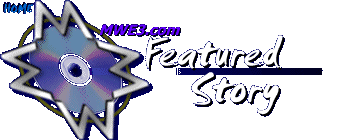a drop in the ocean
an interview with
STEVE HOWE
by Robert Silverstein
Steve Howe was first rock star who ever said the word hello to me.
How you say? As a preface to this interview with Yes guitar great
Steve Howe, come with me back into the time tunnel to the years just
after my high school daze. I was actually a part time (a not knowing
I was aspiring to be) writer for my town newspaper the South Shore
Record, where I had my first album and concert reviews published in
1972 and ‘73.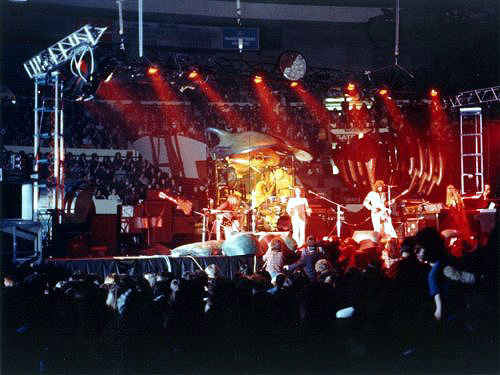 On that fateful day for me I forever remember simply walking in to
the Nassau Coliseum in Uniondale on the afternoon of February, 14th
1974 and getting to spend several hours in the company of the Yes
group before their concert there that night. I was attending college
at New York Tech, in Old Westbury, a 20 minute drive away from where
the show was to be in Uniondale, out here on Long Island. I
On that fateful day for me I forever remember simply walking in to
the Nassau Coliseum in Uniondale on the afternoon of February, 14th
1974 and getting to spend several hours in the company of the Yes
group before their concert there that night. I was attending college
at New York Tech, in Old Westbury, a 20 minute drive away from where
the show was to be in Uniondale, out here on Long Island. I 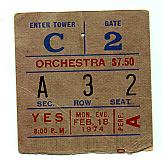 actually
drove to the Coliseum twice from school that day, thinking I just
had to meet Yes, who had just, in my opinion recorded the most important
rock album ever made. After returning back to school the first time,
I remember looking at my teacher drivel on about how I wasn’t
college material or something crazy like that, when, all I could only
think was that Yes were about to play their greatest album ever, Tales
From Topographic Oceans live on Long Island, 15 minutes from where
I was sitting. So here I was, sitting in this class where I kept thinking
I had to go back to do the impossible, meet Yes, surely something
would happen! I had already planned to go to the Yes Garden show in
Manhattan the following Monday, but right then and there it was a
case of now or never! So, I drove back to the Coliseum for the second
time that day. As forever etched in my consciousness, after managing
to sneak (did I say sneak? I mean steadfastly stroll!) into the Coliseum
twice, two different times that day with no one stopping me, and returning
to the same seat, I then miraculously saw and met my high school acquaintance
(and subsequent night school comrade!) Steven Wolf while I sat alone,
in the same seat, watching Mike Tait and company set up the famous
Topographic stage,
actually
drove to the Coliseum twice from school that day, thinking I just
had to meet Yes, who had just, in my opinion recorded the most important
rock album ever made. After returning back to school the first time,
I remember looking at my teacher drivel on about how I wasn’t
college material or something crazy like that, when, all I could only
think was that Yes were about to play their greatest album ever, Tales
From Topographic Oceans live on Long Island, 15 minutes from where
I was sitting. So here I was, sitting in this class where I kept thinking
I had to go back to do the impossible, meet Yes, surely something
would happen! I had already planned to go to the Yes Garden show in
Manhattan the following Monday, but right then and there it was a
case of now or never! So, I drove back to the Coliseum for the second
time that day. As forever etched in my consciousness, after managing
to sneak (did I say sneak? I mean steadfastly stroll!) into the Coliseum
twice, two different times that day with no one stopping me, and returning
to the same seat, I then miraculously saw and met my high school acquaintance
(and subsequent night school comrade!) Steven Wolf while I sat alone,
in the same seat, watching Mike Tait and company set up the famous
Topographic stage, 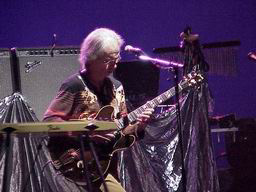 not
knowing what would happen next or thinking I would be thrown out any
minute without any press credentials! Amazingly, Steve also wrote
music reviews for the South Shore Record at that time. And after I
greeted him, we both had mile wide smiles, he told me he was there
to interview Yes that night. He asked if I wanted to come and watch
him interview Jon Anderson. Just like that, holy shit, Wolfy walked
me right in to the dressing room backstage area, where I cowered behind
a sleeping roadie who looked like Atila the hun. That’s when
Steve Howe popped in the room and smiled and simply said ‘Hello!’
Long story short I quickly moved to the right room (the roadie was
still dead asleep) and I went on to spend at least 3 or so hours alone
with my Yes idols.
not
knowing what would happen next or thinking I would be thrown out any
minute without any press credentials! Amazingly, Steve also wrote
music reviews for the South Shore Record at that time. And after I
greeted him, we both had mile wide smiles, he told me he was there
to interview Yes that night. He asked if I wanted to come and watch
him interview Jon Anderson. Just like that, holy shit, Wolfy walked
me right in to the dressing room backstage area, where I cowered behind
a sleeping roadie who looked like Atila the hun. That’s when
Steve Howe popped in the room and smiled and simply said ‘Hello!’
Long story short I quickly moved to the right room (the roadie was
still dead asleep) and I went on to spend at least 3 or so hours alone
with my Yes idols.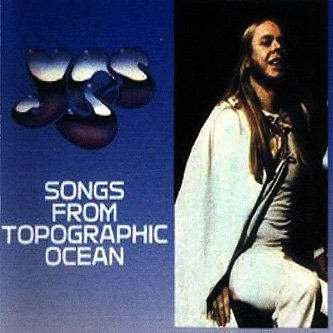 My long lost friend, haven't seen him since, Steve Wolf interviewed
Jon Anderson right in front of my face. A few questions were ridiculous
Steve! He asked Jon if he thought Yes was sounding more like The Band
now, as we each sat on three wooden stools facing each other backstage!
I remember Jon's lizard skin high heel boots and serious business
like demeanor. I suppose what Steve Wolf was getting at was Alan White
had just brought a more earthy drum sound to the Yes lineup! I got
on quite well with the ultra affable Chris Squire, who was the only
Yes member I actually was able to speak with! I swigged a bottle of
wine with Chris while I kept on about how great Yes was, how great
Tales was and how the album changed the music world forever.
After Steve Wolf left I was alone with them, though I was slightly
bummed when Eddie Offord asked Jon, who was surveying the landscape
of the Coliseum, if they wanted a sound check and Jon said no! So,
no soundcheck at the Coliseum that night. I also remember speaking
some to the fabled Yes producer Eddie Offord, who I recall actually
asked me if I could get him some hash that night! Sorry Eddie, I would
have loved to have blown a bowl with you and I haven’t forgotten
your brilliance. I remember Eddie had a young girl with him at the
Coliseum, who I spoke with too! Also strange was I was the only writer,
fan or journalist there with Yes that night, aside from Steve Wolf.
Not a journalist or writer in sight. Why I don't know—considering
that Tales From Topographic Oceans was the most important rock
album of early '74—but looking back, I just chalk it up to fate.
Not bad for a 19 year old college kid and certainly the kind of experience
that would (and did) alter anyone’s life! Being asked by Jon
Anderson to leave the dressing room as they had to change into their
stage outfits, I walked out of the Coliseum in an air of amazing euphoria
to the sound of John Martin's acoustic guitar warming up the crowd.
Funny thing was four nights later, Monday February 18th, 1974 I was
sitting third row center at Madison Square Garden—the Yes concert
that Rick Wakeman proclaimed was the finest ever live performance
of Tales. I always my kept ticket stub from that night, which
you can see above alongside an actual picture with me wearing my red
flannel shirt standing at the foot of the concert stage of that very
Yes Garden show from that Monday, that I found on the excellent www.ForgottenYesterdays.com
(now sadly defunct) web site. At least that's how I found the
picture although I have no idea who took that picture! Eddie? So that
was me standing in front of them throughout the entire performance
of the double album masterpiece that night. And I remember distinctly
that at that show, each seat in the first ten rows in both the A and
R center orchestra sections at the Garden that night each had a new
issue of Melody Maker magazine, laid on the seat. The headline? Insane,
it was “Beatles To Reform” I'll never forget it! Chris Welch
will never live that one down! That Madison Sq. Garden show was possibly
the greatest and most influential concert I ever saw in my life. Looking
back at that milestone in Yes history, it was Tales From Topographic
Oceans, that finally convinced me to take the guitar seriously
and study classical guitar, although I probably should have stuck
with the writing early on!
My long lost friend, haven't seen him since, Steve Wolf interviewed
Jon Anderson right in front of my face. A few questions were ridiculous
Steve! He asked Jon if he thought Yes was sounding more like The Band
now, as we each sat on three wooden stools facing each other backstage!
I remember Jon's lizard skin high heel boots and serious business
like demeanor. I suppose what Steve Wolf was getting at was Alan White
had just brought a more earthy drum sound to the Yes lineup! I got
on quite well with the ultra affable Chris Squire, who was the only
Yes member I actually was able to speak with! I swigged a bottle of
wine with Chris while I kept on about how great Yes was, how great
Tales was and how the album changed the music world forever.
After Steve Wolf left I was alone with them, though I was slightly
bummed when Eddie Offord asked Jon, who was surveying the landscape
of the Coliseum, if they wanted a sound check and Jon said no! So,
no soundcheck at the Coliseum that night. I also remember speaking
some to the fabled Yes producer Eddie Offord, who I recall actually
asked me if I could get him some hash that night! Sorry Eddie, I would
have loved to have blown a bowl with you and I haven’t forgotten
your brilliance. I remember Eddie had a young girl with him at the
Coliseum, who I spoke with too! Also strange was I was the only writer,
fan or journalist there with Yes that night, aside from Steve Wolf.
Not a journalist or writer in sight. Why I don't know—considering
that Tales From Topographic Oceans was the most important rock
album of early '74—but looking back, I just chalk it up to fate.
Not bad for a 19 year old college kid and certainly the kind of experience
that would (and did) alter anyone’s life! Being asked by Jon
Anderson to leave the dressing room as they had to change into their
stage outfits, I walked out of the Coliseum in an air of amazing euphoria
to the sound of John Martin's acoustic guitar warming up the crowd.
Funny thing was four nights later, Monday February 18th, 1974 I was
sitting third row center at Madison Square Garden—the Yes concert
that Rick Wakeman proclaimed was the finest ever live performance
of Tales. I always my kept ticket stub from that night, which
you can see above alongside an actual picture with me wearing my red
flannel shirt standing at the foot of the concert stage of that very
Yes Garden show from that Monday, that I found on the excellent www.ForgottenYesterdays.com
(now sadly defunct) web site. At least that's how I found the
picture although I have no idea who took that picture! Eddie? So that
was me standing in front of them throughout the entire performance
of the double album masterpiece that night. And I remember distinctly
that at that show, each seat in the first ten rows in both the A and
R center orchestra sections at the Garden that night each had a new
issue of Melody Maker magazine, laid on the seat. The headline? Insane,
it was “Beatles To Reform” I'll never forget it! Chris Welch
will never live that one down! That Madison Sq. Garden show was possibly
the greatest and most influential concert I ever saw in my life. Looking
back at that milestone in Yes history, it was Tales From Topographic
Oceans, that finally convinced me to take the guitar seriously
and study classical guitar, although I probably should have stuck
with the writing early on!
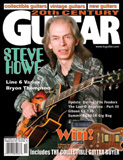 {Flash
forward to 2008. The founder of 20th Century Guitar magazine—which
after 17 years closed down at the peak of the disastrous Bush II era
in late ‘08—Larry "Lawrence" Acunto is major buds
with Steve Howe. Larry used to always interview Steve himself for
the mag, but he finally let me speak to Steve for this '03 interview.
Anyway, the following interview first appeared as the cover story
of the October 2003 issue of 20th Century Guitar. The producer, researcher
and writer of this interview with Steve Howe, Robert Silverstein and
his online music zine mwe3.com now presents the full
uncut version of the interview, originally entitled Steve Howe’s
Remedy ‘Elements’—rare planned pics and
all! I also remember making good old Larry put Bryon Thompson’s
name on the cover for the interview I did with him under Steve’s
name. High the memory carries on! Here now is the complete mwe3.com
interview with Steve Howe - editor, October 11, 2009}
{Flash
forward to 2008. The founder of 20th Century Guitar magazine—which
after 17 years closed down at the peak of the disastrous Bush II era
in late ‘08—Larry "Lawrence" Acunto is major buds
with Steve Howe. Larry used to always interview Steve himself for
the mag, but he finally let me speak to Steve for this '03 interview.
Anyway, the following interview first appeared as the cover story
of the October 2003 issue of 20th Century Guitar. The producer, researcher
and writer of this interview with Steve Howe, Robert Silverstein and
his online music zine mwe3.com now presents the full
uncut version of the interview, originally entitled Steve Howe’s
Remedy ‘Elements’—rare planned pics and
all! I also remember making good old Larry put Bryon Thompson’s
name on the cover for the interview I did with him under Steve’s
name. High the memory carries on! Here now is the complete mwe3.com
interview with Steve Howe - editor, October 11, 2009}
STEVE HOWE’S REMEDY ‘Elements’
by Robert Silverstein
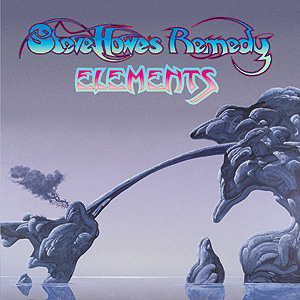 Probably
the name most responsible for defining the electric guitar as the
focal point instrument during the dawning years of ‘70s progressive
rock, guitar giant and current Yes guitarist Steve Howe has released
quite possibly his most spectacular solo album to date. Recorded by
Steve’s group, Steve Howe’s Remedy, his 2003 Elements
CD focuses on and literally redefines just about every
aspect of his varied approach to electric and acoustic guitar performance.
With it’s impeccable mix of 13 instrumental and 3 vocal tracks
that echoes Howe’s finest moments in Yes as well as his eclectic
solo works, Elements sizzles with a compelling rock brew that
tastefully blends in plenty of bluesy riffing and experimental guitar
vibes. Rejoining Yes back in the mid ‘90s, Howe brought the group
back to their classic progressive guitar sound that still keeps their
‘70s catalog in such high demand. Reunited again with the current
core Yes lineup of Alan White, Rick Wakeman, Chris Squire and Jon
Anderson, Howe is poised to create music history yet again. His highly
successful current recordings with Yes makes the release of his 2003
album Elements even more special. Performing all the guitars
and vocals, Howe is truly in his element on Elements. Also
featuring Howe’s sons Dylan (drums) and Virgil (keyboards, harmony
vocals), Gil Atzmon (sax) and Derrick Taylor (bass), the Remedy Elements
sound is often spectacular and overall the album rates as high, on
the brilliance scale, as earlier Howe masterpieces such as Quantum
Guitar (1998), his lush New Age masterwork from 2002 Skyline,
his all-time solo classic from ‘93 The Grand Scheme Of
Things, and even evokes the spirit of the guitarist’s groundbreaking
solo debut from 1975, Beginnings. An album that encompasses
the art and craft of modern guitar playing, Elements is the
final throw that places Howe in the pantheon of the finest guitarists
in music history. In his 2003 20th Century Guitar interview with mwe3.com
founder Robert Silverstein, Steve spoke by phone from his home in
England on September 6, 2003 quite extensively about the Elements
CD, discussing the album’s myriad of musical ideas and various
guitar strategies track by track.
Probably
the name most responsible for defining the electric guitar as the
focal point instrument during the dawning years of ‘70s progressive
rock, guitar giant and current Yes guitarist Steve Howe has released
quite possibly his most spectacular solo album to date. Recorded by
Steve’s group, Steve Howe’s Remedy, his 2003 Elements
CD focuses on and literally redefines just about every
aspect of his varied approach to electric and acoustic guitar performance.
With it’s impeccable mix of 13 instrumental and 3 vocal tracks
that echoes Howe’s finest moments in Yes as well as his eclectic
solo works, Elements sizzles with a compelling rock brew that
tastefully blends in plenty of bluesy riffing and experimental guitar
vibes. Rejoining Yes back in the mid ‘90s, Howe brought the group
back to their classic progressive guitar sound that still keeps their
‘70s catalog in such high demand. Reunited again with the current
core Yes lineup of Alan White, Rick Wakeman, Chris Squire and Jon
Anderson, Howe is poised to create music history yet again. His highly
successful current recordings with Yes makes the release of his 2003
album Elements even more special. Performing all the guitars
and vocals, Howe is truly in his element on Elements. Also
featuring Howe’s sons Dylan (drums) and Virgil (keyboards, harmony
vocals), Gil Atzmon (sax) and Derrick Taylor (bass), the Remedy Elements
sound is often spectacular and overall the album rates as high, on
the brilliance scale, as earlier Howe masterpieces such as Quantum
Guitar (1998), his lush New Age masterwork from 2002 Skyline,
his all-time solo classic from ‘93 The Grand Scheme Of
Things, and even evokes the spirit of the guitarist’s groundbreaking
solo debut from 1975, Beginnings. An album that encompasses
the art and craft of modern guitar playing, Elements is the
final throw that places Howe in the pantheon of the finest guitarists
in music history. In his 2003 20th Century Guitar interview with mwe3.com
founder Robert Silverstein, Steve spoke by phone from his home in
England on September 6, 2003 quite extensively about the Elements
CD, discussing the album’s myriad of musical ideas and various
guitar strategies track by track.
SH: Hello, is that Robert?
RS: Hey Steve!
SH: Yeah, it is Steve. How are you?
RS: Great. You picked a good day to call. It’s a nice sunny day
in New York.
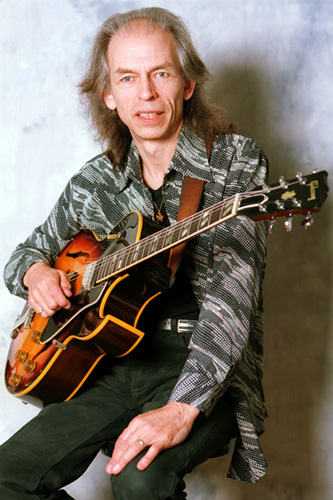 SH:
Good, not too hot. When it’s hot there it can get so hot right?
SH:
Good, not too hot. When it’s hot there it can get so hot right?
RS: Yeah, we’re coming off a pretty wet summer. Amazing finally
getting to do an interview with you! I don’t know why it’s
taken so long. I guess I always assumed Larry Acunto had a lock on
your interviews!
SH: (laughter) Yeah, we like a change. Larry said we ought to not
do interviews for a while, ‘cause we did do a lot together.
RS: It was two years ago you were last on the cover of 20th Century
Guitar. August 2001.
SH: Oh, was I?
RS: It was great meeting you last year at the TCG guitar show on Long
Island. You mentioned you sometimes read my writings for TCG?
SH: That’s right. I do. I like to go through it. I look at all
of it. Even the musical things. It’s a good magazine and I like
being a part of it, you know.
RS: I’ve been a huge fan of Yes since I saw you play in New York
in November ‘71 at the Academy Of Music. Yes was third on the
bill to King Crimson and Procol Harum.
SH: Alright, that’s a long way back.
RS: Do you remember that show?
SH: I remember those shows. I don’t remember each one but I remember
how electrifying they were. Yeah, they were pretty amazing.
RS: So you’re in England now?
SH: I’m in England, yeah.
RS: You kind of introduced me to 20th Century Guitar. You played at
and helped organize the Lilies concert that the mag also had
a part in back in November 1995. That was a pretty star-studded event.
Do you remember that show? I saw the concert and that’s where
I was first introduced to the magazine. They had the issue with the
Beatles guitars. And before the show that night I met you for a minute
when you had a bite to eat at Zen Palate and I gave you a copy of
my newsletter magazine Time & A Word. And then the week after
I called Larry Acunto at TCG and we hooked up at the end of the year.
SH: Yeah! Oh, I do...Every now and again I go back and listen to the
audio and think where I can re-release this. It just needs releases
from the people and a lot of organization. We’ve had some interest.
Yeah, it was a great night. I mean, Gary Brooker just has one of those
voices akin to the Stevie Winwood style of great English soul voices.
RS: Steve, can you just speak a trifle bit louder. (apologies to Steve
for the interviewer’s shoddy phone set-up)
SH: Sure, I will try to. So, Gary Brooker’s got a fantastic great
English voice in the style of soul singers that we’ve had like
Stevie Winwood and Chris Farlow. He could really sing and shout. (getting
back to the Lilies concert) Of course Roy Wood and the band
and just so many...Cheap Trick, Justin Hayward. It was a great night.
RS: And that’s how I met Larry at 20th Century Guitar. So you
had helped organize that show with Annie Haslam.
SH: Yeah. Annie took most of the organizing but I helped out. We got
on and organized that show. It was good.
RS: I’ve been bugging Larry for years about releasing that concert
on CD and DVD.
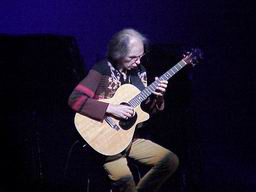 SH:
Well as I said, we have had some interest but finding the right moment
to complete the project...sometimes these projects do take a while.
But also getting the releases from everybody to appear. It takes basically,
a bit of energy from somebody in a managerial position, more than
in the artist position, to kind of oversee it. So maybe that’ll
happen.
SH:
Well as I said, we have had some interest but finding the right moment
to complete the project...sometimes these projects do take a while.
But also getting the releases from everybody to appear. It takes basically,
a bit of energy from somebody in a managerial position, more than
in the artist position, to kind of oversee it. So maybe that’ll
happen.
RS: Your new CD, Elements has got to be up there among your
best solo albums yet.
SH: Good.
RS: What a difference between your 2002 CD Skyline and the
new Elements CD. You recently described that album, ‘It’s
like trying to cross rock with progressive but with a blues and jazz
influence as well. There's more of an emphasis on me leading a band.’
That’s pretty accurate to my ears.
SH: That’s kind of what I’m doing, yeah. Instead of like
doing a massive amount of overdubbing and playing everything in sight
that I can myself, I kind of wanna just to be the guitarist, be the
writer, kind of push the project forward and get people on board to
add some of their ideas too. Because, I play some pretty good bass
but getting a bass player in and saying ‘well, this is what I
thought, but go at it in your own way’ would bring a lot more
to it for me...to have somebody else think about all of the stuff
and adding, having the brass and having Gil Atzmon to really be the
featured sax player but also, on the finished CD, you’ll see
there’s seven other brass players who appear on two of the tracks.
So, you know, it got to be, not out of my hands, but actually not
so much that I’m showing versatility here, I’m showing my
roots.
RS: In that respect, the eclectic range on vocals and rock instrumentals
on Elements kind of reminds me a bit of your 1993 album Grand
Scheme Of Things and also 1998’s Quantum Guitar but
there’s also something very new and different here.
SH: Good. It’s the way I’m using the electric guitar again.
On Skyline, it was a totally different musical environment
that I created there, something very relaxing. No drums, and kind
of a melting pot of casual, relaxing music. And also, before that,
Natural Timbre was also quite light in it’s basic style
because it was acoustic. So, I built up a lot of, kind of desire after
those two albums to do something that was quite a bit more rocking.
And that’s really what we got.
RS: When was the music written? Because I know in the past you’ve
updated and brought to light again music you even wrote in the ‘60s.
SH: Well, I mean that’s true here too. There doesn’t seem
to be a way that I can conceive an album without stretching across
over my writing career because the music that I write in isolation
doesn’t really fit with what I’m doing then, at the time.
So then I revisit it. I can give it a shot in the arm. I can change
things about it. I can rearrange it. Or maybe I like it as it is.
But suddenly, that will come into focus. And how I did it was really
by the two most recent tracks I constructed—”Smoke Silver”
and “Bee Sting”. Everything had to fit with them. Once I
had those two tracks—and they were really new—then I kinda
said, ‘well, what have I got now that’s floating around
here? Oh yeah, that’s good.’ And so the idea that it was
electric guitar and had to have a sort of rocky, and could have a
bluesy feel, allowed me to look at my material and pull out the ingredients.
It goes back across the last few years, but there’s some ideas
that I’ve had for 30 or 40 years (laughter) because sometimes
an idea doesn’t really date. It kind of just finds it’s
right moment to be utilized. There’s a couple of things on there
that I wrote some time back and I’m not really bothered about
that. I find it makes it a successful project for me because I’ve
been able to utilize recordings and that’s one of the things
I like doing.
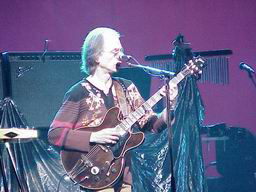 RS:
Both of your sons, Virgil and Dylan are featured on the Elements
CD with you and they have really turned out as great players in their
own right.
RS:
Both of your sons, Virgil and Dylan are featured on the Elements
CD with you and they have really turned out as great players in their
own right.
SH: Absolutely.
RS: I know Virgil has a new CD on Rhino of Yes remixes.
SH: That’s right, he did.
RS: And Dylan also has a new album out in England called The Way
I Hear It, on OT Records?
SH: That’s correct. Dylan’s been drumming from before he
was ten, I think. He basically, got very studious about it and really
centered in on doing that and he’s like a master drummer now.
He really does have a lot of ability to control the direction of music.
He has, for the last few years, been playing with a singer called
Gabrielle, who’s been immensely successful in Europe. And the
Blockheads, even when Ian was alive, Dylan was part of Ian Dury &
The Blockheads as well. So he’s been running a lot of careers
if you like, parallel. And also now, he’s really been pushing
for his own band, The Dylan Howe Quintet some of the time, Quartet
other times. So, his musical direction is definitely jazz. It’s
about the respect for the kind of mid-jazz period. After be-bob, but
not really mainstream. The drummers he’s inspired by are mainly
jazz drummers so, in a way, he kind of builds a picture that pays
some respect to that era. And Virgil, he’s in one band, a trio
called The Dirty Feel, they’re working on their own songs, and
he’s also done the Yes Remixes album. So he does his remixing
and his production side...he’s really quite amazing, because
he’s actually a drummer, like Dylan, in the band The Dirty Feel,
but outside of that, he does keyboards. That’s his first instrument.
So, of course, that’s what he’s doing with me here, as well
as, he’s found his voice and does the harmonies with me so he’s
developing new skills and one of his new skills is taking people’s
songs and kind of jazzing them up. He’s done a load of work on
other remix ideas, not exactly bands but he’s created his own
style of reinventing samples and things. So, he’s across the
board. He’s doing a lot of different things. So I’m very
proud of them both.
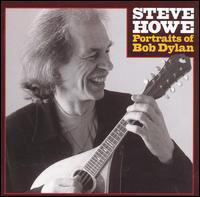 RS:
The Yes Remixes album is pretty amazing stuff.
RS:
The Yes Remixes album is pretty amazing stuff.
SH: It is! It’s not a sit back and think he did a little bit
of work. He did work, more or less, every split second of the time.
There’s things going on in the editing and there’s things
in the reuse of the space and samples...yes.
RS: I ended up really liking it.
SH: That’s what I wanted Elements to...although we haven’t
gotten any remixing on it, I wanted them to influence the record.
And certainly having brass and saxophones and things like that definitely
influences the style of the record but it’s something I wanted.
On my first solo album, I did one song that almost could have been
on Elements, and that was called “Lost Symphony”.
And that had the same kind of brassy riffs and interplay and there’s
a terrific solo at the end where I’m sort of wah-wah-ing and
the sax player, who I can’t quite remember at this moment who
it was but he wailed away on sax. And I guess, like I say about looking
back, it isn’t so much about looking back for inspiration. It’s
more looking back to see what I should be doing now and what I should
be taking note of now. Definitely, the desire to do a record like
Elements has been in the cards for a couple of years. I knew
I was going to want to do this. So I’ve been building up the
tracks, building up the direction really.
RS: The Steve Howe’s Remedy Elements album is your
second CD for IOMA.
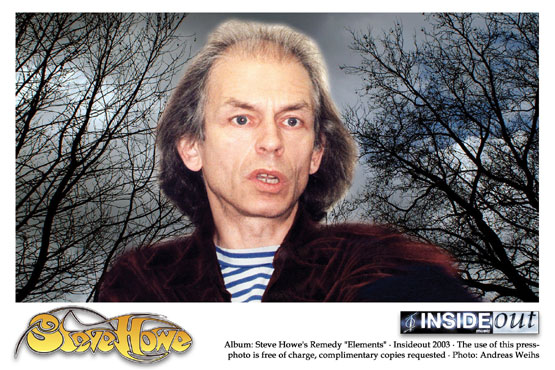 SH:
Yes, that’s right.
SH:
Yes, that’s right.
RS: Chris Squire has a new CD on IOMA. How did you end up releasing
CDs on IOMA and their parent company SPV?
SH: We met up with these people through a connection. We knew SPV.
I think we licensed something to SPV and then we met up with Thomas,
who runs Inside Out and his enthusiasm was just great. I played him
“Small Acts Of Human Kindness” (from 2002’s Skyline
CD) in a sort of preparational sense. Some of the master tracks
were there. Just about ten bars into it he was saying, ‘this
sounds like it’s got the Steve Howe atmosphere’ (laughter).
So as long as he can tell it’s me, he’s really, really excited.
He’s encouraged me not only to stretch out and let me do Skyline
the way I wanted...now this one I dreamed up...maybe they’ll
release Homebrew 1 & 2 in a box set. They’ve basically
been very, very supportive.
RS: Eagle Rock released Natural Timbre and more recently
the Yes Symphonic Live double DVD set. What’s your relationship
with Eagle?
SH: Well the first record we did with them was Portraits Of Dylan.
And then we did Natural Timbre. And they were great to
work with. They just really expected Natural Timbre to do absolutely
great. They thought a lot of the record. So we did a couple records
with them. And I think they’re so kind of busy on so many things.
It’s a bigger label than Inside Out. Well, let’s say, not
bigger...they’re running with a lot more horses. And really different
styles. So I guess they had sort of like a period with me and they’ve
done a lot with Yes over the years as well as you mentioned. And Eagle
Vision has Symphonic Live. We’re kind of free agents but
we’re definitely nurturing the relationship we’ve got with
Inside Out because it’s a very good situation.
RS: Yes also work with Jeff Varner and the Beyond label too.
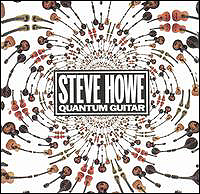 SH:
They’ve been looking after Yes since the Open Your Eyes period.
They’re good people. They’re now called 10th St. Entertainment.
And they work very hard for us.
SH:
They’ve been looking after Yes since the Open Your Eyes period.
They’re good people. They’re now called 10th St. Entertainment.
And they work very hard for us.
RS: From the Elements album “Westwinds” is a real
jazzy track. You say “it's the only thing I’ve ever written
that I would have loved Gil Evans to have arranged”.
SH: Good! I’ve got a fantastic reaction from that track. Just
about everybody I’ve spoken to starts by saying, ‘look,
that third track’....and I go yeah, ‘Westwinds’. And
to me that’s such a thrill because that track’s been real
pipelined, it was crafted in unusual ways, like “Pacific Haze”.
They’re kind of like a pair of tracks that I was working on.
“Pacific Haze” was created in a kind of bizarrely, unusual
sort of way. But going back to “Westwinds”—that was
the sort of structural things that I felt I could really arrange.
And I dreamed up the sort of brass arrangement. I did it on keyboards.
I had keyboard sax, keyboard trumpet...all that kind of thing. And
of course it sounded like keyboard tracks. But it was a good blueprint
for the real brass and basically the way it came together and when
Derrick (Taylor) had added his bass—because I played bass originally—it
wasn’t easy! (laughter) Especially near the end, there’s
a marvelous bit where most things stop and the hi-hat carries on and
there’s a trumpet that goes (sings part) and the thing that’s
featured there is the bass. And I always wondered how he would pull
it off because I pulled that off really good. It’s like stopped
double picking octaves. So you kind of really gotta get moving. But
he got it and that was the exciting thing was that I dreamed up a
track and I really felt I brought it home. I delivered the material
in really quite a new way. That’s a very unusual track for me
to do, let alone be able to do it. I had a lot of fun. That’s
the kind of fun I had when I was just stretching out and not feeling
I had to really define what I was doing. I wasn’t afraid that
this was jazzy. I was kind of like thinking to myself, ‘this
is an interesting starter.’ The kind of melodic side but also
the rhythmic side. So I had a lot of fun doing it.
RS: What a great way to follow on “Westwinds” on the CD
with “Where I Belong” with it’s kind of Dylan-Harrison
inspired vibe.
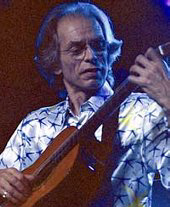 SH:
Good...it’s straight in your face. That’s the only track
really with featured acoustic guitars on it. Most of the other work
is on an electric. For me, it’s a little bit Big Bill Broonzy
as well although he dates back a long way but he was one of the biggest
influences for me in the blues stylings. And it’s got all that
Chet picking going on in the background but also...y’know, I
love playing dobro, although I must say, Jerry Douglas (laughter)
plays dobro...but the way I play it is with my melodic approach and
I don’t do a lot of improvising, certainly not at the meter that
Jerry can so I’m learning and I love the steel. I think maybe
at some point I’m going to have to take a year off and just play
steels, you know dobro, Hawaiian, pedal steel and lap steel because
I love this instrument. It’s another voice that I’ve got
and I think it’s such a great color to have, I couldn’t
live without it. It’s a fantastic thing. On the song though,
the message there is, I take on the sort of blues position, ‘I
haven’t had any life for a while’ and it’s the
sort of position where nobody gets everything that they want. Maybe
you dream as I sang in it, dreaming how things used to be. That it
could be like that again, and that’s the kind of message really
is that happiness isn’t something where you have to recreate
the situation. You just have to resign yourself to letting go and
enjoying the situation. Enjoying now. When you’re young there’s
so many things you look back on when you’re older and say ‘I
was having so much fun’...but half the time you didn’t
know you were having fun. But certainly, I haven’t sang a song
like that and I haven’t ever recorded a song like that (laughter)
and released it...yet. So I like the fact that I’m trying out
this kind of groundbreaking area. Groundbreaking for me. Breaking
new ground.
SH:
Good...it’s straight in your face. That’s the only track
really with featured acoustic guitars on it. Most of the other work
is on an electric. For me, it’s a little bit Big Bill Broonzy
as well although he dates back a long way but he was one of the biggest
influences for me in the blues stylings. And it’s got all that
Chet picking going on in the background but also...y’know, I
love playing dobro, although I must say, Jerry Douglas (laughter)
plays dobro...but the way I play it is with my melodic approach and
I don’t do a lot of improvising, certainly not at the meter that
Jerry can so I’m learning and I love the steel. I think maybe
at some point I’m going to have to take a year off and just play
steels, you know dobro, Hawaiian, pedal steel and lap steel because
I love this instrument. It’s another voice that I’ve got
and I think it’s such a great color to have, I couldn’t
live without it. It’s a fantastic thing. On the song though,
the message there is, I take on the sort of blues position, ‘I
haven’t had any life for a while’ and it’s the
sort of position where nobody gets everything that they want. Maybe
you dream as I sang in it, dreaming how things used to be. That it
could be like that again, and that’s the kind of message really
is that happiness isn’t something where you have to recreate
the situation. You just have to resign yourself to letting go and
enjoying the situation. Enjoying now. When you’re young there’s
so many things you look back on when you’re older and say ‘I
was having so much fun’...but half the time you didn’t
know you were having fun. But certainly, I haven’t sang a song
like that and I haven’t ever recorded a song like that (laughter)
and released it...yet. So I like the fact that I’m trying out
this kind of groundbreaking area. Groundbreaking for me. Breaking
new ground.
RS: And the next track, “Whiskey Hill” sounds like a psychedelic
Chet Atkins thing.
SH: (laughter) Well it was based around one guitar that was played
slightly in a Chet Atkins style. There’s a thing I like doing
with taking a Stratocaster and tuning it to A below E. And then the
strings are kind of like...they feel wonderful. They’re all like
elastic bands. And that’s how I played that. I played this guitar.
I thought...I just liked it so much. (laughter) For a while, I didn’t
know what to do with it. But then I kind of like built it ‘round.
I built things around that guitar. It doesn’t always feature
all the time, but when it does, it’s got that slightly off the
wall, kind of acid-y, kind of Atkins feel (laughter). What happened
with that one was, as soon as I heard it with drums I was totally
sold, you know?
RS: Another cool Remedy Elements song, “The Chariot Of
Gold” is another cool and mellow rocker with those fab horn backups.”
SH: That’s a big production, that one, as far as arrangement
and production and the way that track...I kind of reinvented it. And
it was a track I’d labored over in so many different guises.
Tracks can be, not troublesome, but they can be...you deliberate on
them a lot. You think, ‘I like this but, it’s not quite
right’. You come back to it three months later and you’re
still like enjoying it, but you’re still not there. And then
I just picked up that track, as I said when I was looking at the “Smoke
Silver” and “Bee Sting”, and I said, ‘well, listen,
I am going to bring this track home.’ So for me, that’s
a rewarding track because of the amount of different work I did on
it in different ways and different guises. Now, to me, it’s the
ultimate picture, yeah.
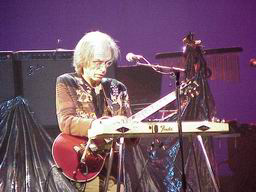 RS:
Track 10 on the Elements CD, “Hecla Lava” I thought
was very experimental. Sounds a bit like Jimi Hendrix.
RS:
Track 10 on the Elements CD, “Hecla Lava” I thought
was very experimental. Sounds a bit like Jimi Hendrix.
SH: Yeah, thanks. The two tracks that I used the GP 100...the finished
CD has got a list of some the gadgetry that made some of these noises.
Roland had a lot to do with some of those way out sounds, particularly
on “Bee Sting” and “Smoke Silver”, where it’s
just Roland VG 88 guitar and this, on the track you’re talking
about, “Hecla Lava”, I moved between a few different settings
on the GP 100, which came out, most probably, five, or six, or seven
years ago. I really believe that the certain sounds they got were
just wonderful and I got it down onto tape and I really liked the
piece. And what it is is improvisation that is allowing me to set
a mood that isn’t at all like playing an acoustic guitar solo.
The sort of twisting and the, as you say, slightly Hendrix-y wildness
of it, it’s a great outlet for me. So, that one, “Hecla
Lava”, and, I can’t think of the title of what the other
one is now...Well there’s two other solos. “A Drop In The
Ocean” finishes the album. That’s the Stratocaster tuned
to A again and then there’s a prettier piece...”Tremolando”,
with like a tremolo effect on it.
RS: “Rising Sun” is maybe my favorite Elements track.
It’s kind of Yes-inspired in a way. Big drums and cool horn sounds.
SH: I know that track well. That’s a stompin’ little track
and there’s some pretty crazy sax work on it too. That’s
when I say I’m straight ahead on this album. A track like “Rising
Sun”, to me, seems pretty much straight ahead. But I know, because
of the chord changes and the timing, it’s got a little Yes-ness.
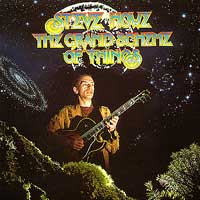 RS:
Before I flip the tape, I want to ask if you’ve heard the new
Chris Squire / Billy Sherwood Conspiracy album called The Unknown?
RS:
Before I flip the tape, I want to ask if you’ve heard the new
Chris Squire / Billy Sherwood Conspiracy album called The Unknown?
SH: No. I heard the other one and I thought it was actually better
than Open Your Eyes (laughter). What do you think of the new
one?
RS: I think, that along with the new String Cheese Incident studio
album, Untying The Not, Chris and Billy’s The Unknown
is one of the best albums of 2003. I was amazed when I heard the
late ‘90s Yes album Open Your Eyes a few years ago. It
had a kind of freshness to the sound that reminded me a bit of The
Yes Album period. And the album still sounds very inspirational.
SH: Mmm...Well I mean I’ve accepted that at times Yes sometimes
does make very different kinds of albums and sometimes that’s
due, well usually that is do to a shift in the song writing team that
is kind of fronting the album and that’s definitely true with
this one because the album came about in an unusual way...not that
I’m going to explain it all now but...Chris and Billy had done
a lot of work on an album that I suppose could have been a Conspiracy
album almost if you like, earlier, and presented it to us. And Jon
and I had hoped to do some other tracks. We said, ‘well, okay
but we could do this track that we’ve got. We had a few tracks
and we thought well we could do those as well. Okay, but then we didn’t
get time to do them (laughter)....’what, we don’t have time
to do this?’...So, it wasn’t a happy album for me but it
was for Chris and Billy. So they got a lot of what they wanted from
it. I mustn't knock that because at times, other times, other members
have got a lot out of what they’re doing with an album. So I
guess those last four albums we made...Keys, Open Your Eyes, The
Ladder and Magnification...all represent a good kind of
forging on but, I think now, Rick’s back, I think we might make
some more serious records. I think there’s 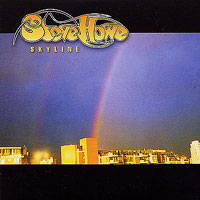 something
about those four records that doesn’t really work a hundred percent
for me and it’s never going to. No amount of listening or revisiting...So
in a way they offer a changing, shifting sort of Yes direction. As
I said, all I can say more about it is, again, what I said, which
is that now Rick’s back I hope we will be able to time the development
of the music to such a degree where we can move from writing songs
into rehearsing and do a brilliant job at that. Because in a way Yes
had great material in the ‘70s to use but also we had a certain
attitude about the way we arranged that I think we need back. We need
to revisit the tried and tested method of trying to consider what’s
going to happen. Because in the rehearsal and arrangement phase, that’s
when a lot of things...you can improve on it when you get in the studio.
And that’s what Yes used to to. We used to do a pretty good rehearsal
and then we used to go and make it even better once we were in the
studio. And I don’t think we did achieve those sort of goals
on those last four albums but I think we could do with the right sort
of guidance and, as I said, the right control because we need to kind
of control the music, the tempo, the intensity. The light and shade,
the arrangement skills have got to come through. Not to say it’s
got to be more complicated. I almost say it’s got to be less
complicated (laughter) and less clogged with sound. ‘Cause I
think now Rick’s back, I think Rick and I have a responsibility
to enhance each other but also be supportive of each other and enhance
each other and I think that’s one of the keys to making the production
of a Yes record really exciting is that you’ve got two (paths),
like Rick and I working off of each other as much as Chris is working
off Alan on the drums. So you get those parallels and then on top
of that you’ve got Jon’s vocals. But if you get it right,
you’ve got something really good and I don’t thing we’ve
had that. So none of those records really meet my criteria for greatness
but they were good at pushing along the creative juices. We revisited
ways of doing things. You don’t necessarily get the right result.
You have to have the right material. So, I think the first thing is
actually getting the material right before you even decide where or
when you’re going to record it. These things we might do.
something
about those four records that doesn’t really work a hundred percent
for me and it’s never going to. No amount of listening or revisiting...So
in a way they offer a changing, shifting sort of Yes direction. As
I said, all I can say more about it is, again, what I said, which
is that now Rick’s back I hope we will be able to time the development
of the music to such a degree where we can move from writing songs
into rehearsing and do a brilliant job at that. Because in a way Yes
had great material in the ‘70s to use but also we had a certain
attitude about the way we arranged that I think we need back. We need
to revisit the tried and tested method of trying to consider what’s
going to happen. Because in the rehearsal and arrangement phase, that’s
when a lot of things...you can improve on it when you get in the studio.
And that’s what Yes used to to. We used to do a pretty good rehearsal
and then we used to go and make it even better once we were in the
studio. And I don’t think we did achieve those sort of goals
on those last four albums but I think we could do with the right sort
of guidance and, as I said, the right control because we need to kind
of control the music, the tempo, the intensity. The light and shade,
the arrangement skills have got to come through. Not to say it’s
got to be more complicated. I almost say it’s got to be less
complicated (laughter) and less clogged with sound. ‘Cause I
think now Rick’s back, I think Rick and I have a responsibility
to enhance each other but also be supportive of each other and enhance
each other and I think that’s one of the keys to making the production
of a Yes record really exciting is that you’ve got two (paths),
like Rick and I working off of each other as much as Chris is working
off Alan on the drums. So you get those parallels and then on top
of that you’ve got Jon’s vocals. But if you get it right,
you’ve got something really good and I don’t thing we’ve
had that. So none of those records really meet my criteria for greatness
but they were good at pushing along the creative juices. We revisited
ways of doing things. You don’t necessarily get the right result.
You have to have the right material. So, I think the first thing is
actually getting the material right before you even decide where or
when you’re going to record it. These things we might do.
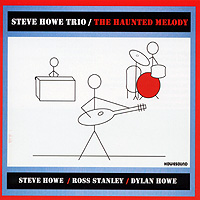 RS:
Well, personally the only thing I thought was missing on Open Your
Eyes were a couple cool instrumental tracks. Also, Jon Anderson
hasn’t made any solo albums recently.
RS:
Well, personally the only thing I thought was missing on Open Your
Eyes were a couple cool instrumental tracks. Also, Jon Anderson
hasn’t made any solo albums recently.
SH: I don’t know. You’re right, he hasn’t. And I don’t
know if he is. I don’t know how Jon feels about that at the moment.
It could be a good thing if he’s saving up material (laughter)
for Yes. Or sometimes, I find, I need to get certain kinds of music
out of my system so I can go to Yes feeling that I can really treat
Yes like a democratic input group. I don’t go to Yes wanting
to, maybe I should, but I don’t go to Yes saying I want this
the way I want it. I really go to it as a group member and try and
collaborate as much as I can. That can work, the way it should work,
but it hasn’t always worked but for me that’s the best I
can do and it can be a pretty effective method to have really, not
exhausted, but explored in one year, like I have with Elements...I
can release this record and say, ‘well that was a big piece of
work I did and now it’s come out.’ And so, as I said, I
can see Yes as a group, not as a vehicle for my solo ideas. There’s
a big difference. If a band member comes in the band and says, ‘I
want to do this song!’...So good luck, where’s that at?
(laughter) So a group can’t operate very well when people are
overly dominant. Anybody. So the group has to be a kind of collective
entity. And that has to be a real thing. Not just a pseudo, y’know,
in front of you it’s a good thing but behind your back we’re
going to change it kind of incident. It has to be a genuine good move
for everybody. That makes it all more exciting because it isn’t
me, or, in this instance, trying to get what I get out of my solo
career, out of Yes. They’re totally different.
RS: Speaking a little more about solo Yes projects, Alan White hasn’t
made a solo album since he made Ramshackled around the time
of the first series of Yes offshoot projects in late 1975. He’s
one of the greatest drummers ever.
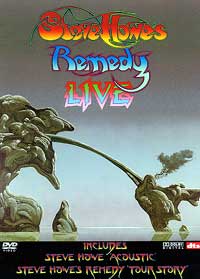 SH:
Certainly. But I mean, I guess Ramshackled...he did that mainly
because it was a kind of band, he kind of knew those guys and they’d
kind of done some stuff. Alan still has his drum clinics and he is
writing music. There’s no doubt about it. Maybe he’ll surprise
us all and get it sorted out now...another Alan White solo album.
I don’t know what he’s got planned. Nobody’s under
any pressure (laughter) so it’s really a question of if and when
they feel good about it.
SH:
Certainly. But I mean, I guess Ramshackled...he did that mainly
because it was a kind of band, he kind of knew those guys and they’d
kind of done some stuff. Alan still has his drum clinics and he is
writing music. There’s no doubt about it. Maybe he’ll surprise
us all and get it sorted out now...another Alan White solo album.
I don’t know what he’s got planned. Nobody’s under
any pressure (laughter) so it’s really a question of if and when
they feel good about it.
RS: So I guess now that Rick’s back (for the time being as he
always seems to be leaving), as you say, the plan is to take the best
elements of say Magnification, Open Your Eyes and The Ladder
and try to forge a new kind of Yes sound?
SH: I don’t know that we know yet what the idea is! It might
be depicted when we start when we start looking closer at the songs
and the collaborated songs. Then (in a time that’s closer)...I
think a group can be a bit like a covered wagon with the horse running...a
rider holding the reigns (laughter). And Yes needs to be the covered
wagon with five horses in front of it but with somebody at the reigns.
So that’s kind of really...I don’t know that any musician
can go on and say, ‘I want this to sound like Fragile’
and the record’s going to sound like Fragile. That’s
not going to happen like that. And the other thing is I think that
Yes, or any group needs success, or needs to increase or is attempting
to, or might be attempting to (laughter) increase their success...and
I think the way we do that has got to be monitored carefully because
I don’t think that people really want Yes to do things that aren’t
like us...alienate them from our music. So the music has to be kind
of conscious of what Yes is without trying to either repeat or...certainly
repeat in two ways. It could be, you don’t want to repeat it
‘cause you did it like that and also you don’t want to just
keep drawing from some sort of well. We can’t really do that.
None of us are that dishonest. But I guess we’ve got to choose,
and flesh out the very best. Because every record we did, by the time
we recorded stuff, we were all totally committed to doing it. And
that’s how we achieved commitment, was that everybody was committed
to that song. We now have had a few songs along the road, where that
wasn’t so and I don’t know why. So there’s that rediscovery.
It could happen.
RS: I guess people are looking back for inspiration.
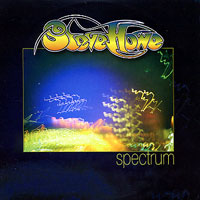 SH:
Rock’s fifty years old, so people can now. They couldn’t
really do it before.
SH:
Rock’s fifty years old, so people can now. They couldn’t
really do it before.
RS: I guess that’s what makes Elements so cool is that
you have so many new and retro styles on there.
SH: Maybe I’m pointing a finger and saying maybe Yes should go
a bit this way too because the basic style of Yes in the last four
albums and the two ‘80s albums, and Union as well, had
a different kind of style of rock. And I think, like you said about
Elements, has got this sort of broad rock-jazz-blues approach,
there’s no reason on Earth why Yes shouldn’t really have
that. But we often don’t. We sound more digitized, more Americanized.
There’s less quieter, gentle moments with slow tempos with hardly
anything going on. This is something we do very well, when we’re
not in a hurry (laughter).
RS: I love Magnification, The Ladder and Open Your Eyes.
I felt that while other groups were running out of ideas, Yes
were coming up with new sounds and musical concepts.
SH: I’m glad you like them. I’m glad people like them. There’s
that sound. But if you ask me what I think (laughter) then I’m
going to tell you that I think there’s something beyond it. That
we’ve got to pick up a new thread, not really take so much from
that but kind of rebuild our criteria, strengthen the taste, agreed
style and taste of the direction and talk about that a little bit
more. So it’s good to hear.
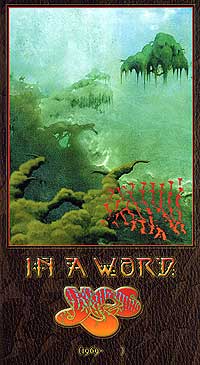 RS:
The new Yes reissues on Rhino are amazing. Did you have a hand in
those? I hear you have a huge vault of tapes.
RS:
The new Yes reissues on Rhino are amazing. Did you have a hand in
those? I hear you have a huge vault of tapes.
SH: That’s correct, yeah. I did have a pretty big hand in the
In A Word: Yes box set although there is more to it than what
you see. But, basically after that, although they consult and I have
my input, sometimes things come out before I’ve got time to say,
‘I don’t know about that, (laughter) or is that such a good
idea?’ So, occasionally I’ve not been able to be as definitely
choosy. Maybe that’s because they value the rarity of certain
things they’ve found and many of them in my tape vault. I have
had a lot of tapes and most of them have gone to Rhino now, which
is kind of a relief for me really. We’re talking hundreds of
tapes.
RS: On the 2003 Rhino Tales From Topographic Oceans remaster,
“The Revealing Science Of God” has the longer intro.
SH: All we did was edit out something about three quarters of the
way through to make it shorter because we couldn’t get that all
on record. And the beginning was longer. And I really like that kind
of beginning. We got used to doing it, like starting together, (sings)
“Dawn Of Light Lying Between A Silence And Sold Sources”...that
originally in the studio we did it as you can now hear on the reissue.
RS: And the new Tales reissue features some cool liner notes
from Mike Tiano. I guess he’s the Yes webmaster.
SH: He is yes. We’ve been lucky. We’ve had a lot of very
talented and clever people working with us like Roger Dean and Michael
Tait, Mike Tiano...the people that’ve helped us. Like Mike’s
done a lot for us, helping us to become more aware about the web site,
the potential there. Now, I’ve got my own web site. I’ve
got my own shop now.
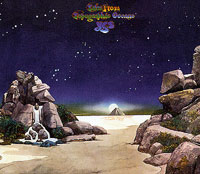 RS:
Anyway I want to talk about the 30th anniversary reissue of Tales
From Topographic Oceans. You call it the double set a ‘thematic
playoff as well as a conceptualization’.
RS:
Anyway I want to talk about the 30th anniversary reissue of Tales
From Topographic Oceans. You call it the double set a ‘thematic
playoff as well as a conceptualization’.
SH: Did I say that? It’s kind of a great joy to me that Tales
never got deleted and it was never the failure that so many people
thought it should be. And it rose and rose in peoples’ view.
And when we play, as we do sometimes, “Ritual” or “Revealing”
then we take them to that place that’s called Topographic
and they seem to like it.
RS: Do you remember the US Tales From Topographic Oceans tour?
I still have my ticket stub from Madison Sq. Garden show on Monday
February 18, 1974 in Manhattan. Third row seat 2 in from the center
aisle. Rick Wakeman said in an interview that the Garden Topographic
show was the only time he thought it was played perfectly.
SH: (laughter) There was a time when we started the tour when we did
play it all. And I suppose what Rick’s talking about is when
we were playing it all then that was the show that we did it best
at maybe. A lot of shows at Madison were fantastic so I’m glad
that one stood out in his mind because Tales wasn’t an
easy project for Rick. He didn’t seem to...Rick and Chris and
Alan, all three of them, were a little bit reluctant to believe that
we could pull it all off and we could actually do four sides (laughter).
And Rick, I think, felt that he suffered mostly with it but that was
because people thought when they heard it that he didn’t do much,
which is amazing to me now, when he’s so much a part of the sound
of the record.
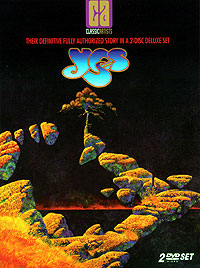 RS:
Also Alan White came into the group at that time, and the sound changed
quite a bit from the highly mechanized prog-jazz sound of Close
To The Edge to the ethereal, quasi New Age rock experimental sounds
of Tales From Topographic Oceans.
RS:
Also Alan White came into the group at that time, and the sound changed
quite a bit from the highly mechanized prog-jazz sound of Close
To The Edge to the ethereal, quasi New Age rock experimental sounds
of Tales From Topographic Oceans.
SH: Yeah, we were floating more, we were drifting. We were just
sort of rocking in a straight ahead way. And of course, Bill’s
(Bruford) influence on the first five records is just stupendous as
far as I can see. He had an amazing effect on not only the way that
we sounded but the way that we constructed the music. And his criteria,
influencing everybody else’s. So I know that Alan had a great
opportunity there to join us with Close To The Edge, and then
as you say, the first record he made with us, was Tales (laughter).
It was quite a lot happening in a short time.
RS: Okay just to backtrack again here, your 1998 album Quantum
Guitar is just amazing. One of my favorites is “Mainland”.
And on Quantum Guitar you also cover “Walk Don’t
Run” and “Sleepwalk”. Those two sort of fall into that
timeless early ‘60s category. That early sound must have had
a great impact on all the great players including yourself.
SH: Oh, it certainly did. Remarkable, the guitar was just a champion.
People out twangin’ and bangin’, tremelo-arming and reverbing
and delays and spins. It was a guitar field day really. And, of course,
because of that, a lot of great music...when Duane Eddy had “Trambone”
as a hit, it was written by Chet Atkins, I was over the moon! There
was just so much enjoyment for the guitar and so many great players
around at that time that it’s hardly surprising that it was such
an influential time. The guitar was just ‘big’...as big
as baked beans! (laugher) Everywhere.
RS: In 1999 you released the CD Portraits of Bob Dylan
which was an interesting and totally unexpected choice, at least from
my perspective. Will there be another one like that?
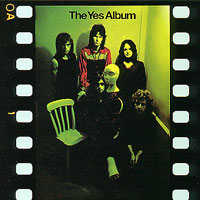 SH:
I don’t know. I certainly like looking at other people’s
music and having a rest from constructing and writing my own. That’s
part of what I enjoy playing on the guitar isn’t one hundred
percent my own material. That would sort of isolate me and I like
playing other music. So, certainly if I conceded that, there are other
great songwriters that no doubt, could easily weather that kind of
attention. So, it’s just a question of timing and picking that
out and I’m still learning from doing the Bob Dylan one, which
was quite a different curve to be on, compared to things like Quantum
Guitar, although there’s similarity in that I did most of
the instrumentation but I had a little help on a few tracks from Geoff
Downes on keyboards. And of course Dylan (Howe) played drums. And
of course I had a host of guest singers. The whole project was a question
of masterminding, overseeing and delivering tapes and sending tapes.
People were doing sessions for me all over the world. And that was
really quite interesting. It was a little bit like the computer age
you’d expect but it was done a little bit less than dialing a
telephone (laughter). A little bit less techno. We just kind of prepared
tapes for people to sing on and then they’d either come back
with a couple of takes or a favorite take and if we wanted to use
something in another way we’d do that. Like when Allan Clark’s
song, from The Hollies, I did a couple of backup harmonies as well.
So there was a nice mix of different things to do.
SH:
I don’t know. I certainly like looking at other people’s
music and having a rest from constructing and writing my own. That’s
part of what I enjoy playing on the guitar isn’t one hundred
percent my own material. That would sort of isolate me and I like
playing other music. So, certainly if I conceded that, there are other
great songwriters that no doubt, could easily weather that kind of
attention. So, it’s just a question of timing and picking that
out and I’m still learning from doing the Bob Dylan one, which
was quite a different curve to be on, compared to things like Quantum
Guitar, although there’s similarity in that I did most of
the instrumentation but I had a little help on a few tracks from Geoff
Downes on keyboards. And of course Dylan (Howe) played drums. And
of course I had a host of guest singers. The whole project was a question
of masterminding, overseeing and delivering tapes and sending tapes.
People were doing sessions for me all over the world. And that was
really quite interesting. It was a little bit like the computer age
you’d expect but it was done a little bit less than dialing a
telephone (laughter). A little bit less techno. We just kind of prepared
tapes for people to sing on and then they’d either come back
with a couple of takes or a favorite take and if we wanted to use
something in another way we’d do that. Like when Allan Clark’s
song, from The Hollies, I did a couple of backup harmonies as well.
So there was a nice mix of different things to do.
RS: So to wrap up, in mid September 2003, Yes are leaving for an Asian
tour?
SH: Yeah, the route is Japan, Australia, Singapore, Hawaii. And then,
I don’t know that’s it been announced yet, but we’re
doing a show with Journey in L.A.—the only show were doing in
America this year is on the 4th of October in Orange County. I don’t
know a lot more about it but by the time this comes out we either
will have done it or be doing it, Yes, so we will be doing that show
I believe.
RS: So are Yes planning any more archival releases? I hear there’s
a live box set coming.
SH: Yeah, the main thing that’s coming besides—they’re
going to get to Tormato and 90125—is that they’re
going to have a triple CD set out of the very best of our live work
and they’re not planning to use very much from Yessongs or
Yesshows or anything that’s been out before. We’re
hoping to keep it nice and surprising. Different sorts of tracks featuring
the rarer songs that we played as when possible. And looking in that
archive there’s an enormous quantity of live recordings. A lot
of it is dreadfully recorded, terribly, badly balanced and has got
noises in the background, hums and clicks and is crap. But a lot of
it is really good as well and some of the mixes are good. The night
we mixed it, or somebody mixed it. But there again, those things you
can get really picky about but the project will encompass the different
members of the band obviously and the different songs that we played
and where possible, putting out the rarest kind of performance of
certain songs.
RS: And I know you said you have tapes from when you first joined
Yes and the band was still playing songs from Time & A Word.
SH: That’s right. That’s a very unusual thing because
I didn’t think I was going to be at all interested in it and
I don’t want to take any credence away from Peter Banks at all,
but I was given a job to play in Yes and in 1970...I think it’s
‘70 or ‘71 we used to play quite a bit of Time &
A Word. So I heard some bootleg recordings and I was amazed that
I was doing it so well. I thought I did a really bad job and therefore,
‘can you bury this? I don’t want to hear it.’ But instead,
I did a pretty good job and I always loved the songs. And maybe, part
of the reason I loved them is ‘cause I did actually play them
(laughter) for a while. I’ve got a feel for “Astral Traveler”,
“Then” and “No Opportunity Necessary”. I kind
of know that repertoire a little bit. I loved what I did with the
songs, so I hope we’re going to use those as well as a fair helping
of what Peter did.
RS: Also are you planning to release a DVD?
SH: Yeah we’ve got something really interesting coming along.
I don’t want to say much about it, ‘cause I think it spoils
it but when we get closer we’re going to shout our mouths off
about it. But it’s gonna be a good thing. You know, I haven’t
done one so, in a way, I want one DVD to kinda cover aspects of my
work in a complete sense. So it’s going to be a sort of complete
look at various ways I work and the first volume, most probably, is
going to be the solo, what I’ve done solo as a guitarist on my
own, standing up there playing. And I’ve got some terrific footage
of that. I’ve kept it all these years and it’s going to
be the main project. But it’s still in the creative stages. Having
film is one thing and converting it to DVD is a process so I would
think I’d get a lot of work done on it next year and if possible
have it out at the end of next year.
Thanks to Steve Howe @ www.stevehowe.com
- Inside Out Music America IOMA @ www.insideoutmusic.com -
Jeff Varner @ 10th St. Entertainment @ www.10thst.com - Mike
Tiano @ www.nfte.org
Chipster PR and Larry Acunto @ 20th Century Guitar magazine - also
thanks to Pete Whipple @ www.forgottenyesterdays.com
- Bryon Thompson
and photographers Sue Quinn and Roman Dino and Tom Bromirski for the
kind permission of their live pictures.
